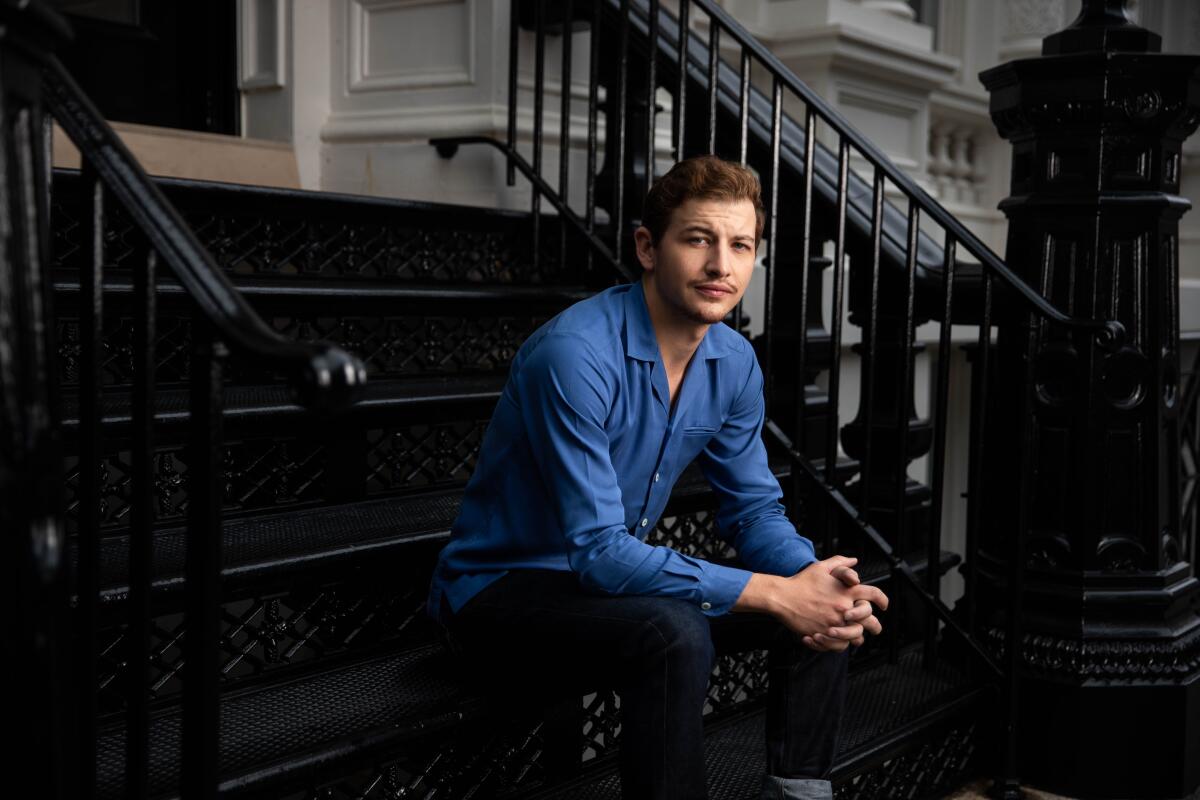Tye Sheridan has worked with Malick and Spielberg. How was George Clooney different?

- Share via
Things have been pretty charmed for Tye Sheridan. Discovered by Terrence Malick when he was barely in his double digits for “The Tree of Life,” he’s since worked with Steven Spielberg (“Ready Player One”) and now, at 25, he’s a veteran appearing in no fewer than two award season contenders: Paul Schrader’s “The Card Counter” and “The Tender Bar,” directed by George Clooney. Additionally, the Austin, Texas, resident is unfailingly polite on the phone and has an enviable set of guitars hanging in his office. What’s not to like?
The Envelope sat down to talk about Sheridan’s past, present and wide-open future.
You had to take a break on “The Card Counter” because of COVID-19, which shut down production last March. Where did you quarantine and what did you do?
Mostly just working on projects at home [with my cousin] in Austin. But a friend and I started a company called Wonder Dynamics — a media tech startup — so when I’m not working on films, I’m working on that. We went on a long road trip for two months, and I started fly fishing. We didn’t see another soul for weeks. I thought, “When are we ever going to have time like this, to just escape from the world?”
Do you think it changed the way you see the world?
Definitely. It was so good to take a step back from where you are in life, your career, where we are as a society in the world. I hope 2020 gave everybody an opportunity to see the world in a different light. I’ll be curious as we get further away from this event to see how we bounce out of it. How society evolves around it, maybe evolves with it.
Maybe that’s something your company will be dealing with?
Totally. We’re in the business of building production tools and an AI production platform — using artificial intelligence, machine learning and deep learning methods from the fields of robotics and automation to power film production tools.
“Card Counter” and “Tender Bar” are pretty different films, but they both deal with a grittier side of the human experience — bars, casinos. Is that a world that interests you?
A lot of times it’s where you find the most interesting characters. Where you meet unique people or hear interesting stories. I do play poker, but I’m not the most avid player. I grew up around poker players. I spent every weekend in a cabin deep in the woods of East Texas, near the Trinity River — this place where all the guys in my family and family friends would go to escape their everyday lives and jobs. They’d pass around a whiskey bottle and play poker.
Is whiskey your drink of choice?
I like beer, but for a fancy night out, a vodka martini. But if I’m in Texas and there’s good mescal on the shelf, I’ll have mescal on the rocks.
“Card Counter’s” Cirk is an interesting character; he’s so angry about his father’s death. Do you have a personal catharsis when playing someone who’s that angry?
You’re constantly channeling your own stuff through the characters you play, and that’s when acting becomes therapeutic. That’s when it becomes genuine, when you start to care about what these characters are going through, because it becomes personal. I try to find that in all the roles I choose. It helps you understand yourself.
You’ve worked with several powerhouse directors in your career so far — Malick, Spielberg, Schrader. What was different about working with Clooney?
He talks to you like no other director, because he’s an actor. He understands everything you’re doing, and it almost feels like you’re acting it together a bit. He told me when he was doing “ER,” which Spielberg executive produced, that Steven came to set and watched him do a scene, then pulled him aside and said, “If you keep your head still, you’ll be a movie star.” Simple things like that George would talk about, tricks that are old acting tricks. Uncovering those rocks, it’s fun.
Your acting resume started when you were still an adolescent. What’s the future like for you?
My personality is I have six too many hobbies, my hands in 12 different buckets and I’m curious about a lot of things. It’s a blessing and a curse — my mom’s always telling me, “You need more sleep, you look too thin.”
Like a lot of moms, I bet.
That’s what I felt. I’ve become very interested in the democratization of things — filmmaking, production tools, acting, directing. That’s what the heart of our company is about.
So will you abandon acting at some point to dive into that area?
Somebody once said, “If you’re an actor, it’s like you’re part of a painting. You can be the best shade of blue. But if the painter sucks, no one’s going to notice how good you are.” Being able to develop your own stories and execute them the way you want to — that’s where I want to take my passion into the future. I’m hoping to tell stories for the rest of my life.
More to Read
From the Oscars to the Emmys.
Get the Envelope newsletter for exclusive awards season coverage, behind-the-scenes stories from the Envelope podcast and columnist Glenn Whipp’s must-read analysis.
You may occasionally receive promotional content from the Los Angeles Times.









